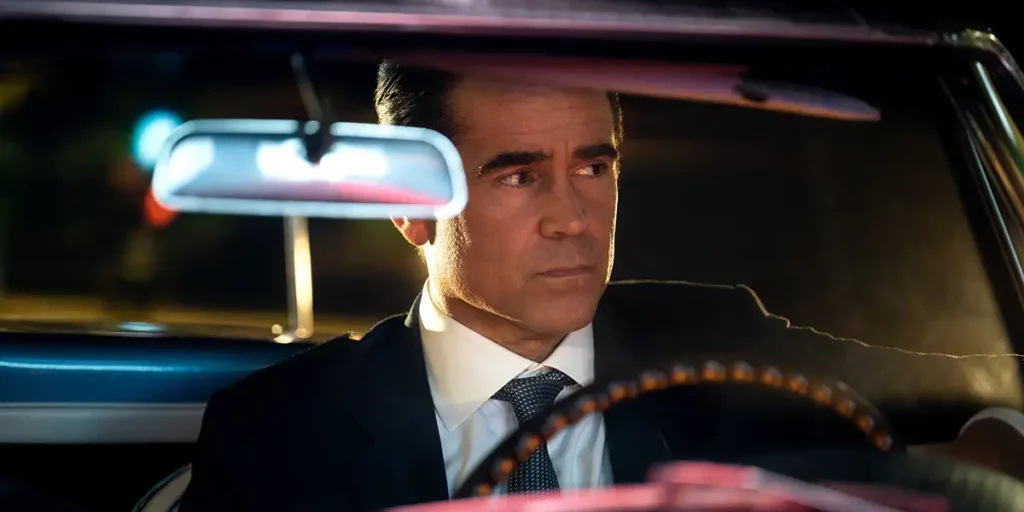Colin Farrell shines in Apple TV+ series Sugar, a new take on the classic film noir detective story with a modern, albeit far-reaching, twist.
The detective noir genre is one laced in Hollywood history. Great actors like Robert Mitchum, Humphrey Bogart and Jack Nicholson have all dabbled in gritty and unpredictable stories about hardboiled detectives with a pension for justice but a general distrust for mankind. It’s a genre that proves nostalgic for the time of black-and-white pictures and effortlessly cool leading men. It’s a challenging genre to bring into modern times due to its innate tie to such a specific time in film history. However, Apple TV+ series Sugar, showrunner Mark Protosevich and lead Colin Farrell’s attempt to revive this classic genre for a modern audience, knocks the revival of detective noir out of the park.
Sugar follows John Sugar (Colin Farrell), a slick private investigator with an uncanny ability to read the people around him. After returning home to Los Angeles following a mission in Japan, legendary film producer Jonathan Siegel (James Cromwell) personally reaches out to Sugar with a request for his services. Siegel’s granddaughter, Olivia (Sydney Chandler), a reformed wild-child drug addict, has gone missing without a trace and he believes Sugar is the only man fit to find her with the level of discretion needed for such a high-profile case. At the behest of his case manager, Ruby (Kirby), Sugar agrees to work for Siegel as he is a major cinephile, obsessed with Sigel’s work, and feels a personal, yet indescribable, connection to Olivia. As Sugar investigates Olivia’s disappearance, he begins to unearth and observe the dark inner workings of this family that is considered Hollywood royalty.
While Sugar centers its plot around a missing person’s case, at its core it’s about John Sugar’s desire to connect with the people around him. Of course the series includes the stereotypical warning given in all detective films and tv shows, to not get too involved in the case, but ultimately, through this missing person’s case, Sugar is able to understand the people around him, and himself, in a deeper, richer way. Sugar is a unique type of leading man. While Farrell effortlessly evokes the slick, suave manners of a world class private detective, there is a vulnerability he is able to tap into that gives the show its heart.
John Sugar remains a vague mystery to the audience throughout the run of the show. He is friendly and truly cares about the people he comes into contact with. In the first episode he asks a man living on the street to watch his car while he goes to question Olivia’s former step-mother Melanie (Amy Ryan): not only does he ensure to remember his name when returning several hours later, but he makes a plan to get him off the street and in a safe living environment.

Sugar is a man who wants to do good and admittedly hates violence, but beyond that there is not much we know about him. He has this innate understanding of people, but a deep disconnect from them which is presented as a hazard of the job. Sugar’s job is to find missing people, but once he finds them, he does not get to be a part of the rest of their story; his job is over and he must now move on. He is contracted to find people, but never gets to see the aftermath of the missing people being reconnected with their loved ones or resuming their lives.
Colin Farrell devours this role as a man who is tasked with solving deeply nuanced mysteries while being a mystery himself. It is the detective role that an actor of his caliber deserves, because while it acknowledges the archetype of the loner detective, it dares to go beyond surface level struggles and actually forces plenty of self reflection. Especially when comparing Farrell to his role in True Detective, it is clear this type of optimistic, warm detective can pack more of a punch than the typical gritty hyper-violent detectives that modern crime dramas favor. Farrell is accompanied by a plethora of other knockout performances from Amy Ryan, Dennis Boutsikaris and Anna Gunn as branches of the Siegel family that all have secrets of their own with motives unknown to Sugar.
The pacing and style of Sugar make the series referential enough to classics like Chinatown (1974) or The Maltese Falcon (1941), but director Fernando Meirelles is still able to craft the show in a way that makes it stand on its own two feet. I think what makes the series work so well is that it doesn’t run away from the material it is reminiscent of. Meirelles frequently makes parallel cuts between the show and classic noir detective films, in some episodes even using monologues or scenes from these types of movies in order to foreshadow the fate of his own series. In doing this, Meirelles is able to draw and pay homage to the films this series was inspired by but also create his own new and exciting plot lines from them. Sugar is a show that keeps its audience guessing. Where you think the plot is going to zig, it zags and throws in a twist you never even saw coming.
These twists, however, do not all pan out in the show’s favor. Sugar enraptures its audience through a solid mystery, genuine characters and phenomenal acting that all build to what should be a completely unexpected and powerful conclusion to end this wonderfully crafted season. The ending we are given, however, is one that leaves the audience disappointed and craving further resolution.
While it’s not that the final two episodes offer no solace to the story we have been tactfully following, the issue lies in how the mystery is solved, as it seems so out of line with the rest of the show. Sugar spends six episodes intricately developing a unique style and unpredictable story arc that lends itself to stand as one of those rare golden first seasons, largely due to its extreme attention to detail. However, the series seems to abandon itself with a twist that doesn’t not make sense, but doesn’t seem necessary and takes away the attention of the mystery that has been so carefully concocted. It’s hard to not judge the show entirely based on the last two episodes, as it derails the plot in a way that is detrimental to the integrity of the series and honestly seems like a hard and unnatural reach for a second season.
Sugar is a refreshing and vibrant show with a pulse that widens and narrows the scope of which it wants its viewers to look at its story. Seemingly every moment of the first six episodes plays a part in the bigger mystery of what has happened to Olivia Siegel and what led to her disappearance. Farrell masterfully leads a pack of punchy performances as a man who is infatuated by the human condition but unable to completely grasp it. Unfortunately, within the show’s final two episodes, the series’ ambition overtakes the plot and leaves them to become outliers from the earlier episodes that existed in understated brilliance. The conclusion to the central mystery is rushed, which is the biggest casualty, as the viewer has high hopes for its resolution. The series as a whole is not something to be dismissed, however, as there really is some magic in Sugar.
Sugar is an eight-episode series. The first two episodes will premiere on Friday, April 5, 2024 on Apple TV+, followed by one new episode every Friday. Read our reviews of other Apple TV+ shows.
Loud and Clear Reviews has an affiliate partnership with Apple, so we receive a share of the revenue from your purchase or streaming of the films when you click on the button on this page. This won’t affect how much you pay for them and helps us keep the site free for everyone.

